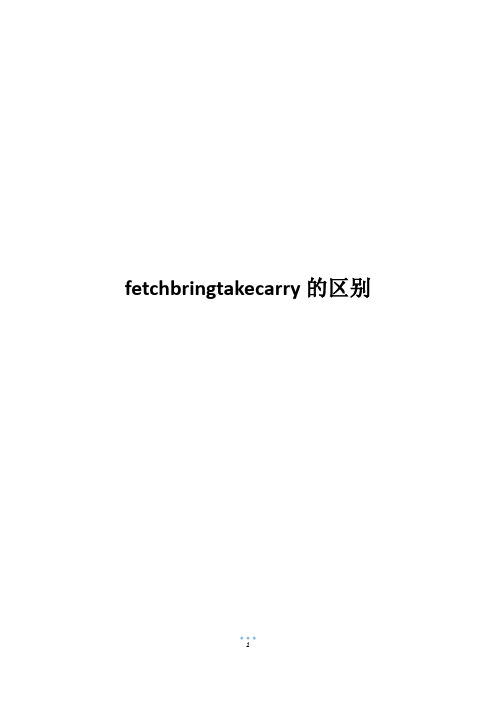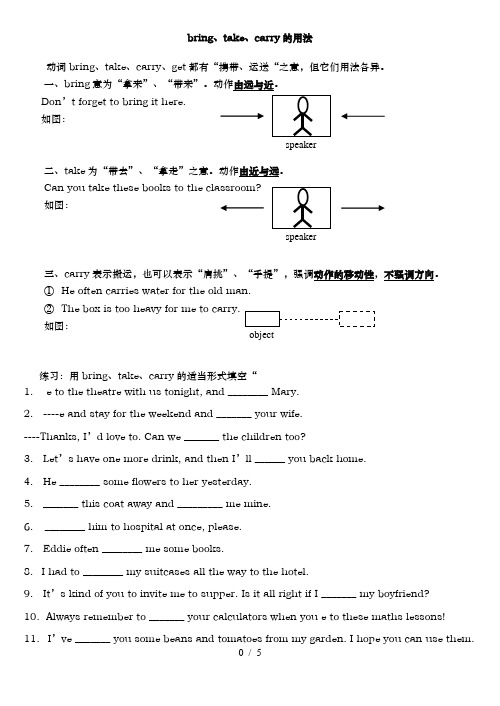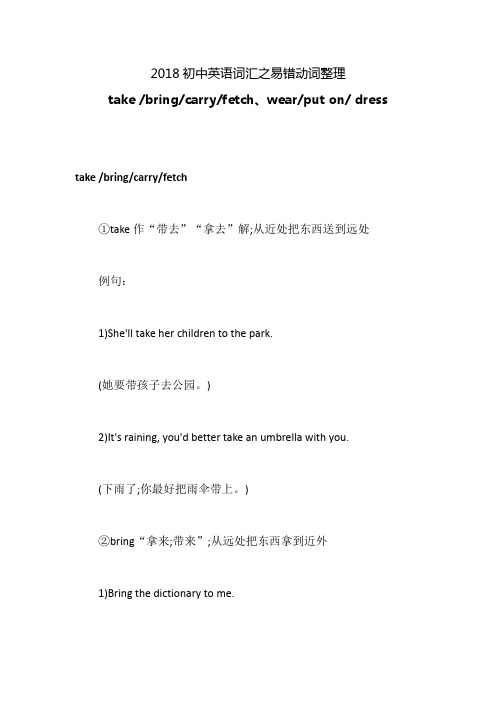take和bring的用法
七年级下册同近义词用法辨析

七年级下册同近义词⽤法辨析七年级下册同/近义词⽤法辨析⼀、take/bring这两个词都是动词,都含有“带”或“拿”的意思,但使⽤场合各不相同。
bring作“带来”、“拿来”解;take是bring的对语,作“带去”、“拿去”解。
例:Why don't you bring your girl friend to the party?你为什么不把你的⼥友带来参加宴会?Next time don't forget to brig me a copy of your work.下次不要忘了把⼀份您的作品带给我。
Please take these books to the library for me.请把这些书替我带到图书馆去。
Take the box away,please.请把盒⼦拿⾛。
练习:8. Please ______ them to the classroom.9. .She always ______ a lots of books home with her from school.10. Can you ______ the hat to me when you come?11. Please ______ these things to your brother.12. I often ______ my baby brother to the park.⼆.interesting/ interested/interestinterested 形容词感到有趣的常⽤短语是:a. be interested in sth.对某事感兴趣b. be interested in doing sth. 对做某事感兴趣例如:I am interested in English. 我对英语感兴趣.He is interested in playing football. 他对踢⾜球感兴趣.interesting 形容词有趣的做定语和表语例如:1.The book is very interesting. 这本书很有趣.(表语)2.The story sounds interesting. 这个故事听起来很有趣.(表语)3.That is an interesting film. 那是⼀部有趣的电影.(定语)interest 1. 可数名词兴趣例如:His main interests are reading and playing the piano. 他主要的兴趣是读书和弹钢琴.2.短语place of interest 名胜古迹(复数变place) 例如:He knows many places of interest.他知道许多名胜古迹.练习:选词填空interest/interesting/interested1.The book is _________. Most of the teachers are _________in it.2.3岁的时候He ____ _______ _______music when he was 3 years old.3. The boy has much _________ in drawing.4.他们昨天参观了许多北京的名胜。
fetchbringtakecarry的区别

fetchbringtakecarry的区别fetch bring take carry的区别:含义、用法及强调重点不同。
fetch意为拿来、卖得,相当于go and bring;bring意为带来、取得、提供,强调方向;take意为运走、引领、场景,也是侧重方向;carry意为搬、携带、输送,不涉及方向,只强调方式。
一、fetch的含义及用法fetch作为动词,意为(去)拿来;(去)请来;售得,卖得(某价)。
例句:The inhabitants have to walk a mile to fetch water.居民得走一英里路去取水。
Sylvia fetched a towel from the bathroom...西尔维娅去卫生间拿了一条毛巾。
I helped out in the tents fetching and carrying.我在帐篷里帮忙打杂。
Could you fetch me my bag?你能帮我去取我的包吗?二、bring的含义及用法bring作为动词,意为带……到某处;带来;取来;提供;供给;导致;引起。
例句:Don't forget to bring your books with you.别忘了把书带来。
The team's new manager brings ten years' experience to the job.该队的新经理到任时已有十年的相关经验。
Retirement usually brings with it a massive drop in income.收入通常随着退休而大大减少。
Hello Simon! What brings you here?你好,西蒙!什么风把你吹来了?三、take的含义及用法1、作为动词,意为携带;拿走;取走;运走;带去;引领;使达到,把……推向,把……带到(另一个层次、层面等)。
take bring的用法

take bring的用法
1. Take 通常表示“拿走”“带去”呀。
比如,“I'll take this book with me.”(我要把这本书带走。
)想象一下,你去朋友家看到一本特别喜欢的书,你就可以说这句话,然后开心地把书拿走啦。
2. “Bring”则相反,是“带来”的意思哦。
就像,“Could you bring that pen here?”(你能把那支笔带来这儿吗?)这就好比朋友有支笔你很想用,就会这么喊他给你带过来呀。
3. 哎呀,当你出门时说“I'll take my umbrella.”(我要带上我的伞。
)不就是要把伞拿走嘛,这就是 take 的用法呀,多形象!
4. 再看看“Bring me a cup of coffee.”(给我带一杯咖啡。
)这种时候就是让别人把东西给带到你这儿来,就是 bring 啦,很简单又实用吧!
5. 你想想,说“He took his dog for a walk.”(他带着他的狗去散步。
)是不是很自然地就用了 take 来表示带着狗出去了呢?
6. 而“Please bring your laptop tomorrow.”(明天请把你的笔记本电脑带来。
)这里用 bring 是不是再合适不过啦?
7. 当你说“I'll take it.”(我要了。
)是不是感觉很果断地就把某个东西拿走了呢,这就是 take 的魅力呀!总之,take 和 bring 就是这样有意思又常用的词呀,学会它们让我们的表达更准确呢!我的观点就是,掌握好 take 和 bring 的用法,日常交流就会更顺畅啦!。
bring与take等近义词的区别和巩固练习

bring 、take 、carry 的用法动词bring 、take 、carry 、get 都有“携带、运送“之意,但它们用法各异。
一、bring 意为“拿来”、“带来”。
动作由远与近。
Don ’t forget to bring it here.如图:二、take 为“带去”、“拿走”之意。
动作由近与远。
Can you take these books to the classroom?如图:三、carry 表示搬运,也可以表示“肩挑”、“手提”,强调动作的移动性,不强调方向。
① He often carries water for the old man.②如图:练习:用bring 、take 、carry 的适当形式填空“1. e to the theatre with us tonight, and ________ Mary.2. ----e and stay for the weekend and _______ your wife.----Thanks, I ’d love to. Can we _______ the children too?3. Let ’s have one more drink, and then I ’ll ______ you back home.4. He ________ some flowers to her yesterday.5. _______ this coat away and _________ me mine.6. ________ him to hospital at once, please.7. Eddie often ________ me some books.8. I had to ________ my suitcases all the way to the hotel.9. It ’s kind of you to invite me to supper. Is it all right if I _______ my boyfriend?10. Always remember to _______ your calculators when you e to these maths lessons!11. I ’ve _______ you some beans and tomatoes from my garden. I hope you can use them.12. Please _______ my hat to me tomorrow.13. ________ your raincoat with you. It's going to rain.14. _________ the book here.15. ________ your umbrella when you go out.16、Next year you may ________ your family over from England.17、Why don't you ________ your girl friend to the party?18、Next time don't forget to ________ me a copy of your work.19、Please ________ these books to the library for me.20、________ the box away,please.21、They are ________ some paintings to the art gallery.22、This bus is licensed to ________ 100 passengers.by, with, in表示“用”、“通过”……方法、手段、工具的用法1、by :①以……方法、手段②指搭乘某种交通工具③表示传达、传递的方式或煤介;如:He makes a living by selling newspapers.My brother gets to school by bus every day.2、with:①表示用…工具(具体有形的工具)②(表材料或内容)以,用……来填充如:He broke the window with a stone.3、in :表示用…方式;用…语言(语调、笔墨、颜色)等;如:What's this in English?特别注意:在表示“乘坐”时,by与take 的区别by 为介词,与交通工具搭配,其后只能接交通工具的原形,且交通工具不能加任何词。
take和bring的区别用法

take和bring的区别用法take和bring的区别用法概述在英语中,“take”和”bring”都是表示携带或带来某物的动词,但在使用上有一些区别。
本文就这两个词的用法做详细讲解。
用法一:方向的不同1.“take”通常表示从说话人所在位置或所在地带走或携带,如:–Please take this book to the library.(请把这本书带到图书馆。
)2.“bring”通常表示朝说话人所在位置或所在地带来或携带,如:–Can you bring me a glass of water?(你能给我拿一杯水吗?)用法二:焦点的不同1.“take”通常强调从某处到另一处的移动,如:–I took the bus to work this morning.(我今天早上坐公共汽车上班。
)2.“bring”通常强调从别处到说话人所在位置的移动,如:–She will bring the cake to the party.(她会把蛋糕带到派对上。
)用法三:参照点的不同1.“take”的参照点通常是说话人自身或所在位置,如:–Take your umbrella with you.(带上你的雨伞。
)2.“bring”的参照点通常是说话人所在的位置,如:–Please bring your ID card when you come.(请你来的时候带上你的身份证。
)用法四:物品的不同1.“take”通常用于将物品从某处带走,如:–He took the newspaper out of the bag.(他把报纸从包里拿出来。
)2.“bring”通常用于将物品带到说话人所在位置,如:–Could you bring me a pen from your office?(你能从你的办公室给我带一支笔来吗?)用法五:与人相关的不同1.“take”可以指带走或携带某人,如:–She took her children to the park.(她带着她的孩子去了公园。
10-bring,take与fetch的用法

2.--Oh,I've left my schoolbag in the classroom.
--Don't worry.I'll________ it for you.
A.bring B.get C.take D,carry
3.This is Lucy's book. Can you _________it to her?
【练一练】用fetch,take, bring,carry填空。
1. Let me ___________ the chair for you.
2. He asked us to _____________ our notebooks and pens when we go to listen to the report.
5. I left my English book in the classroom. Could you help me to _________ it for me ?
1.___Байду номын сангаас__ away this dirty shirt and ______ me a clean one.
A.Pick, bring B.Bring, take C.Take, bring D.Carry, bring
3. We are going to go on a picnic tomorrow. Please remember to _________ your umbrella with you.
4. I won’t __________ my daughter to the wedding, she is so naughty.
2018初中英语词汇之易错动词整理【(take、 bring、carry、fetch)(wear、put on 、dress)】

2018初中英语词汇之易错动词整理take /bring/carry/fetch、wear/put on/ dress take /bring/carry/fetch①take作“带去”“拿去”解;从近处把东西送到远处例句:1)She'll take her children to the park.(她要带孩子去公园。
)2)It's raining, you'd better take an umbrella with you.(下雨了;你最好把雨伞带上。
)②bring“拿来;带来”;从远处把东西拿到近外1)Bring the dictionary to me.(把字典拿给我。
)2)Please bring your report with you when you come tomorrow. (明天你来的时候,请把你的报告带来。
)③carry作“携带,带去;搬运”1)She always carries a red handbag.(她总是带一个红色手包。
)2)Please carry this TV set upstairs.(请把这台电视搬到楼上去。
)④fetch作“去…取来,拿来;叫某人来”1)The football is over there. Fetch it please.(足球在那边呢,请把它拿回来。
)2)Fetch the police at once. We've found the robber.(马上去叫警察来,我们已经发现那个抢劫的人。
)wear/put on/ dress①wear穿着,戴;留,表示“状态”是及物动词需加宾语例句:1)She always wears a pair of glasses.(她总是戴着一副眼镜。
)2)He wears a black jacket today.(今天他穿着一件黑色的夹克。
)②put on穿上,戴上,表示“动作”例句:。
bring take carry的区别与用法

bring take carry的区别与用法
嘿,咱今儿就来好好唠唠“bring take carry”的区别与用法,宝子们可得听好啦!
先说说“bring”,它呀,就像是你给别人带个东西过来。
比如说,“I will bring you a cup of coffee.”(我会给你带一杯咖啡。
)这是不是很形象呀?就像你把东西从别的地方带到特定的人这里。
再瞧瞧“take”,这就有点像你把东西拿走啦!像“Take this book with you.”(把这本书带走。
)就感觉是把东西从这儿弄到别的地儿去。
然后呢,是“carry”,想象一下你背着个重重的包,那不就是在“carry”嘛。
比如说“She carried a big suitcase.”(她提着一个大行李箱。
)就是这种拎着、扛着的感觉呀。
哎呀,“bring take carry”这三者区别可大啦,咱可不能弄错呀!你想想,要是该用“bring”的时候用成“take”,那不就闹笑话啦?
所以说呀,得好好记住它们的区别和用法,这样咱说话、写东西才不会出错呢,对吧?以后咱就可以准确无误地用它们啦!。
- 1、下载文档前请自行甄别文档内容的完整性,平台不提供额外的编辑、内容补充、找答案等附加服务。
- 2、"仅部分预览"的文档,不可在线预览部分如存在完整性等问题,可反馈申请退款(可完整预览的文档不适用该条件!)。
- 3、如文档侵犯您的权益,请联系客服反馈,我们会尽快为您处理(人工客服工作时间:9:00-18:30)。
take和bring的用法
你感觉到入夏的“节奏”了吗?伴随着气温升高,雨水也越来越多,出门的时候别忘记带伞。
等一下,这“别忘记带伞”的英文怎么说?
说起“带”这个词,通常我们脑海中第一就会闪过“take”和“bring”这两个单词。
而同样作为带,很多人都知道他们是一组反义词。
Take
to move or go with someone or something from one place to another 简单说就是把某个东西或某人,从这里带去另一个地方。
例
1. Don't forget to take your umbrella.
别忘记带走你的伞。
2. I'll take you home.
我会带你回家。
3. I'm going to take some cake to Paul.
我会给Paul带点蛋糕。
4. Take your dog away from me.
带你的狗走开。
5. Please take your bag there.
把你的包带到那里去。
Bring
to take something or someone with you to the place where you are now, or to the place you are talking about
简单说就是把某个东西,从另一个地方带来这里。
例:
1. Would you like me to bring anything to the party?
你希望我带什么东西来派对吗?
2. She brought her Spanish friend into class.
她把她的西班牙朋友带到班里来了。
3. Bring some food to the party at my house.
带一些食物到我家的派对来。
4. Bring your homework to me.
把你的作业带给我。
5. Please bring your bag here.
请把你的包拿来这里。
Bring shows movement toward the speaker, but take shows movement away from the speaker.
所以,take和bring的区别用法相当简单,一点就通:take是“去”,bring 是“来”。
那么在“忘记带东西”的情况中他们该怎么用?其实,不能想当然地认为这两个词是截然不同无法相互替换的。
实际上,这句话分以下3种情况。
1. 嘱咐别人别忘记带走某个东西
2. 嘱咐别人别忘记带来某个东西
3. 已经忘记带上某个东西了
我们先来看情况1,很明显是带“走”,毫无疑问用take
例句:
Don't forget to take your cellphone.
别忘记带走你的手机。
Don't forget to take your wallet.
别忘记带走你的钱包。
我们再来看情况2,很明显是带“来”,毫无疑问用bring
例句:
Don't forget to bring me your gift.
别忘记给我带礼物。
Don't forget to bring Robert to me.
别忘记带Robert来见我。
现在问题来了,情况3是“带走”还是“带来”?
其实,情况3是这样的:
在遗忘时,正处在地点A,而现在已经离开到达地点B,符合take的条件。
在想起时,已处在地点B,本应该带来的东西在地点A,符合bring的条件。
于是,在情况3下,take和bring成了可以相互替换、通用的一组词。
例句:
I forgot to take/bring my umbrella.
我忘记带伞了。
I forgot to take/bring my key. 我忘记带钥匙了。
以上区别,你分清了吗?。
